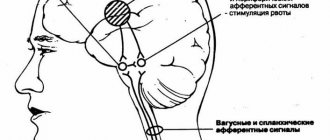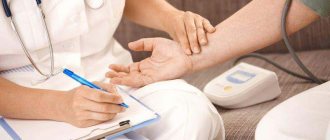SPECIALISTS Gynecologist Gynecologist-endocrinologist Pediatric gynecologist Mammologist-oncologist Dermatologist Hirudotherapist Intimate plastic surgery Doctor Contour plastic doctor Ultrasound doctor SERVICES AND PRICES Gynecology Mammology Ultrasound diagnostics Paid tests Intimate surgery Contour plastic Treatment for women PROMOTIONS AND DISCOUNTS Students Teams Friends and subscribers am For residents of the region For pensioners Promotions in clinic
How many days later can pregnancy be determined if a girl has had sexual intercourse and no contraception was used? Or is this a long-awaited, planned event expected for a long time? In this material we will tell you about the main methods, how to quickly and more reliably find out about pregnancy and when it is best to use them.
So, the main thing is why is all this necessary and when should you take this issue to the clinic? Determining pregnancy in the early stages is necessary if at some point the girl felt the birth of a new life within herself. Either to one degree or another does not exclude such a possibility. I would like to say right away that we will not discuss the exact determination of weeks of conception and testing using “folk”, “grandmother’s” methods (soda, iodine) in order to save time. We will ignore various online services, such as “drop a drop of urine on the touchpad, move your finger counterclockwise and immediately find out the result in 1 minute”, for they are, at a minimum, not scientific, and more specifically, for quackery.
How does conception occur?
During ovulation, a mature egg is released into one of the two fallopian tubes.
After sexual intercourse, sperm that enter the vagina rush up the cervix into the uterine cavity, and then into the fallopian tubes, where fertilization occurs. The fertilized egg begins to divide rapidly - pregnancy occurs. Approximately 7-8 days after conception, the dividing egg descends into the uterine cavity and attaches to its wall. From the moment of fertilization, the woman’s body begins to produce the hormone human chorionic gonadotropin (hCG). It is the concentration of this hormone that rapid pregnancy tests react to. However, in the first weeks after fertilization, its content in the blood is too low, which is why pregnancy tests are not reliable in the first weeks after fertilization. But the woman herself can feel the changes that occur in her body under the influence of this hormone.
How many days after conception can pregnancy be detected?
There will be no 100 percent answers to the question “after how long can pregnancy be determined.” The female body is absolutely individual. Most often, symptoms are felt around the tenth day. But the time frame varies depending on the body's sensitivity to hormonal changes. The onset of pregnancy can be fully confirmed after the development of certain factors. It is impossible to identify signs on the first day of conception.
In principle, signs of pregnancy appear quite early. After approximately 1-2 weeks after conception, apathy, drowsiness, and pain in the chest area are likely. After 14-20 days, nausea, sudden love for some foods and aversion to others are possible. A few days before the expected menstruation, the basal temperature rises.
Woman's well-being
Signs of early pregnancy are individual and depend on physiological characteristics. Moreover, even for one woman they can differ during different pregnancies. A week after possible conception, a woman may experience fatigue, malaise, drowsiness, a slight heightened sense of smell, or an increased urge to urinate. Sometimes small spotting occurs - the so-called implantation bleeding, which occurs when a fertilized egg attaches to the wall of the uterus. It must be remembered that all these signs are very subjective and should not be relied on.
So, let's start, 29 first signs of pregnancy in the early stages:
- Implantation bleeding . When a fertilized egg enters the walls of the uterus, a slight discharge of blood may occur. If there is profuse bleeding, you should immediately consult a doctor.
- Nagging pain in the lower abdomen can also be the first signs of pregnancy before menstruation. You will feel slight cramps, the uterus will contract and give you the feeling of premenstrual pain.
- Basal temperature . Its increase - this first sign of pregnancy is one of the most accurate, with the exception of serious gynecological diseases. Let us remind you that the basal temperature is measured in the rectum in the morning; during pregnancy it will remain more than 37 degrees.
- Delayed menstruation . However, it is worth remembering that there can be many reasons for cycle disruption, and to accurately determine the first signs of pregnancy, it is necessary to exclude possible causes of delay, such as stress, menopause, excessive physical activity, lack or, conversely, excess weight and others.
- Menstruation is not like previous ones . This sign of pregnancy in the first days can manifest itself as: less abundant discharge, a shift in the cycle, a change in its duration.
- Toxicosis . The most common first sign of pregnancy before delay. Morning sickness and malaise may indicate pregnancy.
- Breasts swell. This is another common sign. You will notice that the breasts are swollen and enlarged.
- Breast sensitivity increases.
- The labia will change color , they will become more swollen and take on a bluish tint. As a rule, this sign is noticed by the gynecologist during examination.
- Fatigue and drowsiness are also sure signs of a pregnant woman.
- Increased sensitivity to smells is one of the first signs of pregnancy before your period. Your sense of smell will change, smells will be more pronounced, and your feelings for them will be heightened.
- , a change in taste preferences may also be a sign . You may want new foods, in different combinations.
- Intuition . Many women feel their pregnancy intuitively.
- An increased urge to urinate, mainly at night, may also indicate pregnancy.
- Changes in sexual desire . This occurs due to changes in the sensitivity of many receptors in the body of a pregnant woman.
- Montgomery tubercles on the areola of the breast - small bumps.
- The appearance of age spots on the face .
- A dark line in the lower abdomen , as a rule, appears by the end of the first trimester and is a sign of pregnancy at 2-3 months.
- The appearance of spider veins not only on the legs, but also on the face, neck, and chest.
- Stretch marks . This sign of pregnancy appears after 3 months, when the tummy begins to grow. Stretch marks appear due to rupture of collagen fibers, which are responsible for the elasticity of the skin.
- A sign of pregnancy will also be an increase in the size of the uterus , this will be determined by the doctor at the appointment.
- Abdominal enlargement . This sign becomes clearly visible after the third month, but in some women the tummy begins to increase in the second month of pregnancy.
- Changes in the shape of the uterus can also be determined at an ultrasound appointment with a gynecologist.
- Positive pregnancy test . As a rule, modern tests only err in the opposite direction - they may not show pregnancy; if the test shows two lines, then this is one of the most accurate first signs of pregnancy before menstruation.
Basal temperature measurement
Fluctuations in basal temperature reflect the course of the menstrual cycle. So, during the cycle this indicator is approximately 36.5⁰ C. When ovulation occurs, the temperature exceeds 37⁰ C and remains until the onset of the next cycle, falling to 36.5⁰ C the day before the onset of menstruation. However, if the egg is fertilized, the temperature does not drop, but remains at a level above 37⁰ C. This method cannot be called very reliable, since if a woman has hormonal disorders, temperature readings cannot have diagnostic value. In addition, temperature data can be affected by incorrect measurement, stress, overwork or climate change.
The appearance of acne.
This symptom is also associated with hormonal changes in the body. Acne can appear even in women who have never suffered from it before. Acne during pregnancy usually disappears when hormonal levels stabilize and no longer bothers the woman. You can often miss this phenomenon, mistaking it for a component of premenstrual syndrome, especially if you have previously been treated for acne. Topical, and especially systemic, retinoids can adversely affect fetal development, so you should stop using these medications if there is a delay.
Pregnancy tests
Dip and tablet tests that detect pregnancy using a urine sample, as well as blood tests for pregnancy, are related to the hCG hormone. Its blood level doubles every two days in the first weeks of pregnancy. To obtain a reliable result, it is recommended to take a laboratory blood test for hCG no earlier than 3-4 days, and use test strips no earlier than 7 days after a missed period. If the test result is negative and there is no menstruation, you need to repeat the test or consult a doctor.
Dizziness, fainting.
Brief loss of consciousness is usually associated with pressure changes. Even if a woman has never lost consciousness before, she should be especially careful. If you feel dizzy, you should provide access to fresh air: ask those nearby to open the window and ventilate the room. To avoid fainting, try to choose loose clothing made from natural materials that is appropriate for the weather. If your job involves physical labor, then you should consider reducing your workload during the day.
Ultrasound and doctor's examination
The doctor will be able to determine pregnancy, or rather, detect the fertilized egg, using an ultrasound examination with a transvaginal sensor approximately 5-6 days after the delay of menstruation or 3-4 weeks after fertilization. This method is considered the most reliable, although this study is usually prescribed at a later date. Without an ultrasound, during an external examination at the earliest stage of pregnancy, the doctor will be able to determine pregnancy.
History of contraception Ancient times One of the first mentions of a condom as a means of protection in antiquity - approximately 3000 BC. In Cretan... Read more
HIV infection: causes and symptoms of infection What is HIV infection HIV infection is a disease caused by infection with the human immunodeficiency virus (HIV). This virus is slowly...
More details
Intrauterine Device An intrauterine device is a small plastic device that is inserted inside the cervix and provides contraceptive…
Read more
Determination of pregnancy and due date by analysis
In order to accurately determine the duration of pregnancy, you need to donate blood from a vein on an empty stomach. A blood test can indicate the due date accurately down to the day and is carried out in the early stages, already on the 6th day after conception. Indicators of the pregnancy hormone, hCG, human chorionic gonadotropin, are determined in the blood. It is this hormone that is responsible for the development and course of pregnancy. It blocks the menstrual cycle and activates the production of other hormones necessary to maintain pregnancy. HCG activity remains active throughout pregnancy.
The hCG hormone is detected both in the blood and in the urine. However, its concentration in the blood increases much faster, so a blood test will be more informative at a very early stage than a test using urine.
It is very important to know that determining the level of the hCG hormone is an important point in early pregnancy research. The values become especially important in case of threats, frozen pregnancy, or ectopic pregnancy. Diagnostics can only be carried out in specialized laboratories and only a specialist can interpret the results. There are no hCG tests for home use.
When might the first signs of pregnancy appear?
This may seem strange, but in obstetrics the gestational age is counted from the last day of menstruation.
The main signs of pregnancy starting from the 1st obstetric week:
| Signs and symptoms | Weeks (from missed cycle) |
| moderate cramping and discharge | 1-4 |
| fatigue | 4-5 |
| nausea | 4-6 |
| tingling or chest pain | 4-6 |
| frequent urination | 4-6 |
| bloating | 4-6 |
| seasickness | 5-6 |
| mood swings | 6 |
| temperature changes | 6 |
| high blood pressure | 8 |
| severe fatigue and heartburn | 9 |
| cardiopalmus | 8-10 |
| breast and nipple changes | 11 |
| acne | 11 |
| noticeable weight gain | 11 |
Let's take a closer look at the 10 most common early pregnancy symptoms. It is important to know that these symptoms can not only be caused by pregnancy, but can also be associated with various health conditions. Therefore, the presence of these symptoms does not necessarily indicate that you are pregnant.
How to find out if you are pregnant or not at home?
As an alternative to modern tests, some women use unconventional methods. In the early stages, they are not accurate and can be regarded rather as an additional means of control. It is important to verify your results in your doctor's office. How to check if you are pregnant at home:
- Using baking soda. Based on determination of urine pH. In the absence of pregnancy, when mixing soda with urine, you can observe a reaction accompanied by bubbling and hissing of the liquid. During pregnancy, the pH changes and the soda simply precipitates.
- How can you tell if a woman is pregnant using iodine? By dropping the substance into the urine, you can see that the iodine stain of a pregnant woman will remain intact for some time. Otherwise, dissolve.
- Another method for determining whether you are pregnant is to boil urine in an iron pan. Pregnant women will have sediment in their urine. However, this is how the protein behaves, the appearance of which does not always indicate pregnancy.
Tips on how to understand that you are pregnant at home are advisable to use only after the expected date of your period. Until this moment, it is useless to wait for results from these not the most accurate methods.
How to determine without a test?
There are many tips on how to understand whether you are pregnant or not at home.
They are based primarily on an assessment of one’s own condition. Indeed, some women claim that from the first days they felt the onset of conception. How to understand that you are pregnant before your period is missed at home:
- Assess the general condition. The appearance of weakness, drowsiness, loss of concentration is typical for a pregnant woman. If such a condition appears suddenly, then you should be wary.
- Frequent urination. Against the background of hormonal changes, a pregnant woman increasingly has to “run” to the toilet.
- How to understand that you are pregnant by changing eating habits. The desire to eat something salty, sweet or unusual is typical for a pregnant woman. A craving for strange combinations can also signal the onset of conception. It is difficult to say how many days later you can understand that you are pregnant. Unusual preferences sometimes appear immediately, and sometimes later.
- Toxicosis. An aversion to food and the smell, leading to vomiting, is observed in the early stages if a girl is pregnant.
- Pressure drop. Often, pregnancy is discovered in an unsuspecting woman after a drop in blood pressure. In some cases, the readings are so low that the pregnant woman loses consciousness.
- How to tell by your belly whether you are pregnant or not. After conception, the pulsation in the abdomen can be heard better. It is enough to press on it to make sure that you are pregnant.
- Dreams. It’s a subjective factor, but a number of girls are convinced of its veracity. A woman dreams of fish, clean reservoirs, small children. On what day can you understand that you are pregnant through dreams? A number of mothers claim that they saw similar pictures in the first days after conception.
How can I tell if my girlfriend is pregnant?
Often representatives of the fair sex deliberately report an imaginary child. Some people try to maintain relationships in this way, while others pursue selfish goals. You can bring the second half to clean water. First you need to carefully observe the girl’s behavior. When a girl is pregnant, she is characterized by frequent mood swings, tears for no reason, followed by laughter. However, similar manifestations accompany premenstrual syndrome.
It is also worth paying attention to the body. Enlarged breasts, swollen nipples and their darkened halos signal that the woman is pregnant. Swelling of the legs may also occur after conception. Veins in the legs often become more visible. If a girl feels sick at the sight of food, feels weak and gets tired quickly, then this should also be alarming.
Absence of menstruation is a more accurate symptom of pregnancy. It is not always possible to track this moment, but if a guy lives with a girl, then this is quite possible. Of course, you need to know the expected start dates of your periods.






